Dichrostachys cinerea, Veerataru, Sickle Bush Uses, Research
Dichrostachys cinerea, also called Sickle Bush or Chinese Lantern tree protects liver and kidney from toxins with antioxidant activity. It is also an excellent diuretic. It is called Veerataru in Ayurveda.
Botanical name- Dichrostachys cinerea (Linn) Wt.et. Arn
Family-mimosaceae (Simbi kula / Babbula upakula)
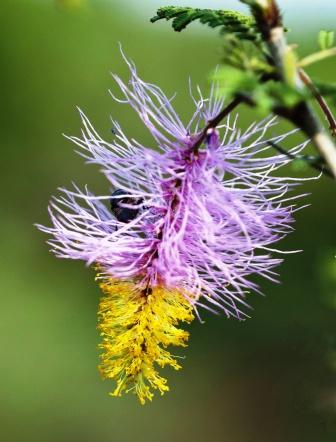
Table of Contents
Vernacular names
Names in different languages:
English Name – Sickle bush, Bell mimosa, Chinese lantern tree, Kalahari Christmas tree,
Hindi Name – Velantara, Virataru, Vurtuli, Kunali, Khairi
Kannada Name – Odavinaha, Vaduvarada gida
Telugu Name – Lathuga, Nellajammi, Venuturu
Marathi Name – Sigam kati, Durangi babool
Gujarati Name – Kellumtaro, Mordundiyun, Marud
Tamil Name – Vidatalai, Veluturu,Veduttalam, Vidattalai Chettu
Malayalam Name – Vitattal
Oriya Name – Khoiridya
French – acacia Saint Domingue
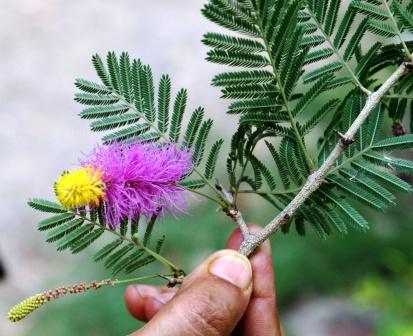
Chemical constituents
Dichrostachys cinerea chemical Constituents:
Root-n-octacosanol
Bark- Friedielin,a-amyrin
Heartwood- Octacosanol, Sitosterol.
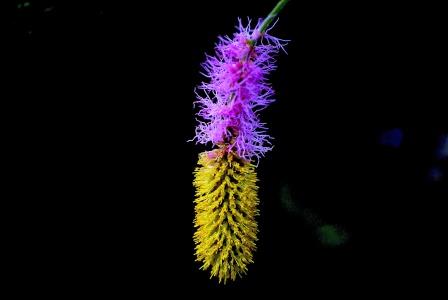
Properties, part used, dosage
Dichrostachys cinerea medicinal Properties:
Guna (qualities) -Laghu – light to digest
Rasa (taste) – Tikta – bitter, Katu – pungent
Vipaka- Katu – Undergoes pungent taste conversion after digestion
Veerya – Ushna – Hot potency
Effect on Tridosha: Balances Vata and Kapha Dosha.
Part used-Stem bark, Heart-wood, root
Dosage- Decoction 50-100 ml
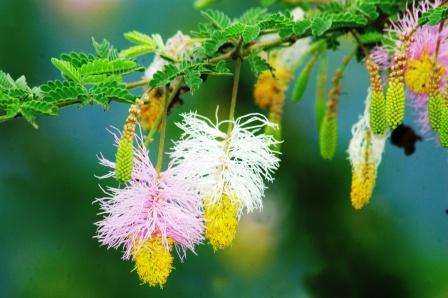
Sanskrit verse
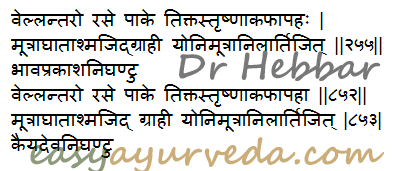
Uses, indications
Chinese lantern tree uses:
Grahi – absorbent, useful in diarrhea , IBS
Indicated in:
Trushna – excessive thirst
Mutraghata – Urinary retention
Ashmari – Kidney and bladder stones
Yoniroga – gynecological disorders
Mutraruja – Dysuria
Traditional Uses
- Tender shoots are used to treat inflammatory conditions, diarrhea, arthritis and relieves pain (analgesic).
- Tender shoots are bruised and applied to the eye in inflammation of the eye.
- Plant is used in piles, dysentery, vaginal white discharge, eye disease, gonorrhea, eczema.
- Infusion of its roots is used to treat leprosy, syphilis and cough. It acts as anthelmintic, purgative and diuretic.
- In Epilepsy, pounded roots and leaves are used.
- For snake bites and scorpion stings, roots / leaves are chewed and placed on the sites of bite.
- Leaves are used as a remedy to treat sore eyes, toothache, gonorrhea, and boils. Leaves have diuretic, laxative properties and act as local anesthesia.
- For massage of fractures, its leaves powder is used.
- Leaves are rich in protein and mineral content. They are highly palatable.
- Roots are used to treat rheumatism, urinary calculi and renal ailments. They have astringent properties.
Interaction with medicines, supplements
Can this be used while taking Homeopathic medicine?
Yes. This product does not react with homeopathic medicine.
Can this medicine be continued while taking supplements like multivitamin tablets, Omega 3 fatty acids etc?
Yes. Generally, this product goes well with most dietary supplements. However, if you are taking more than one product per day, please consult your doctor for an opinion.
With western medicines
Seek your doctor’s advice if you are taking this product along with other western (allopathic / modern) medicines. Some Ayurvedic herbs can interact with modern medicine.
If both Ayurvedic and allopathic medicines are advised together, then it is best to take Allopathic medicine first, wait for 30 minutes and then take the Ayurvedic medicine.
Sthanika karma (Systemic Acton)
Externally – Analgesic and Anti inflammatory in nature. External application of its bark / Leaf paste is indicated in Joint pain
Internally
Nervous system – Indicated in neuro muscular pain.
Digestive system – Carminative and absorbent. Indicated in low digestive fire, Malabsorption syndrome etc.
Reproductive system – Indicated in female reproductive disorders (vatika yoniroga)
Circulatory system – Indicated in Elephantiasis
Satmikarana – Indicated in Amavata, joint pain etc.








